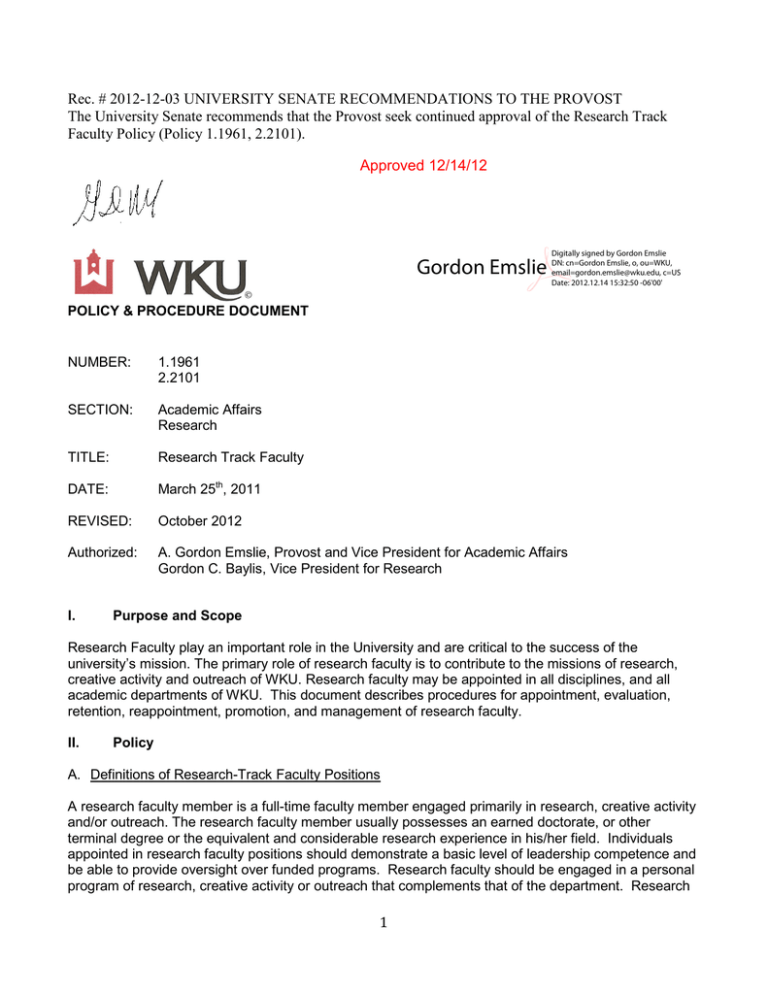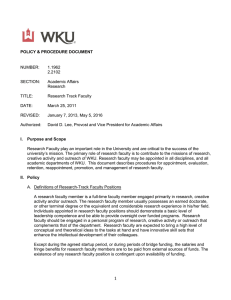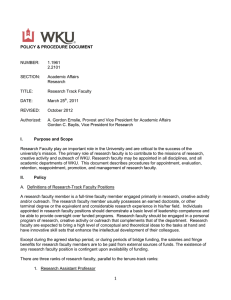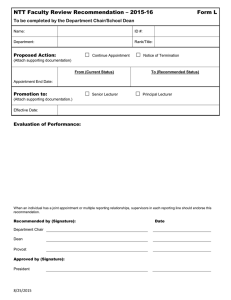Rec. # 2012-12-03 UNIVERSITY SENATE RECOMMENDATIONS TO THE PROVOST
advertisement

Rec. # 2012-12-03 UNIVERSITY SENATE RECOMMENDATIONS TO THE PROVOST The University Senate recommends that the Provost seek continued approval of the Research Track Faculty Policy (Policy 1.1961, 2.2101). Approved 12/14/12 Gordon Emslie Digitally signed by Gordon Emslie DN: cn=Gordon Emslie, o, ou=WKU, email=gordon.emslie@wku.edu, c=US Date: 2012.12.14 15:32:50 -06'00' POLICY & PROCEDURE DOCUMENT NUMBER: 1.1961 2.2101 SECTION: Academic Affairs Research TITLE: Research Track Faculty DATE: March 25th, 2011 REVISED: October 2012 Authorized: A. Gordon Emslie, Provost and Vice President for Academic Affairs Gordon C. Baylis, Vice President for Research I. Purpose and Scope Research Faculty play an important role in the University and are critical to the success of the university’s mission. The primary role of research faculty is to contribute to the missions of research, creative activity and outreach of WKU. Research faculty may be appointed in all disciplines, and all academic departments of WKU. This document describes procedures for appointment, evaluation, retention, reappointment, promotion, and management of research faculty. II. Policy A. Definitions of Research-Track Faculty Positions A research faculty member is a full-time faculty member engaged primarily in research, creative activity and/or outreach. The research faculty member usually possesses an earned doctorate, or other terminal degree or the equivalent and considerable research experience in his/her field. Individuals appointed in research faculty positions should demonstrate a basic level of leadership competence and be able to provide oversight over funded programs. Research faculty should be engaged in a personal program of research, creative activity or outreach that complements that of the department. Research 1 faculty are expected to bring a high level of conceptual and theoretical ideas to the tasks at hand and have innovative skill sets that enhance the intellectual development of their colleagues. Except during the agreed startup period, or during periods of bridge funding, the salaries and fringe benefits for research faculty members are to be paid from external sources of funds. The existence of any research faculty position is contingent upon availability of funding. There are three ranks of research faculty, parallel to the tenure-track ranks: 1. Research Assistant Professor This is typically a person serving in their initial academic appointment following completion of formal training in research or creative activity. Such a person may begin service at this rank by working within program of a senior colleague but also should be building an independent program while at this rank. It is typically expected that such a person will have been a named individual on funded program(s), and will begin serving as the principal investigator / program director (PI/PD) on funding proposals. 2. Research Associate Professor This is typically an established scientist, scholar or artist with a regional or national reputation, who has consistently supported him or herself by extramural funding. Research Associate Professors must have demonstrated independence in program leadership, e.g., by serving as PI/PD on funded extramural grant applications. 3. Research Professor This is typically a senior scientist, scholar or artist with a national or international reputation, who has made substantive impact in their field discipline. He or she will typically have a sustained history of supporting themselves and others from extramural funding. B. Roles, Rights, and Responsibilities of Research Faculty 1. Research faculty are governed by the rights and responsibilities of tenure-track faculty as outlined in the Faculty Handbook, except for those rights and responsibilities directly related to teaching. 2. The primary assignment of research faculty will be research. However, research faculty have the same responsibility to contribute to the intellectual life of the university as any other faculty. Research faculty are expected to become engaged in academic and scholarly activities including but not limited to performing collaborative research with academic faculty; supervising undergraduate or graduate research; serving on departmental or college committees (albeit to a lesser extent than tenure-track faculty); and organizing, attending, and presenting at professional conferences, seminars, and/or colloquia. 3. Research faculty members also accept responsibility for respecting the rights of students, other faculty, and staff. Research faculty are expected to maintain honesty and integrity in all professional activities and to adhere to all stated policies and procedures of WKU. 4. Research faculty will have access to department resources consistent with their role in the department. This will include office or laboratory space, access to computers and the computer 2 network infrastructure, and to department funds as determined by the department head. The academic unit assumes the responsibility of providing research faculty members with appropriate resources not normally funded by grants and contracts such as space and office support. III. Procedure A. Appointment 1. The process of creating a research faculty position may be initiated by a faculty member or by a department head. 2. A department may place an advertisement for a specific research-track position, following all applicable university and state rules. Alternatively, an applicant may respond to an advertisement placed by the Office of Research, working together with a sponsoring department. 3. Applications for research-track positions must include a curriculum vitae, a plan for funding that will support faculty member's salary and fringe benefits during the initial period of appointment, plus some startup funding for the research program if applicable, and three or more letters of reference. Reference letters may include letters from faculty within the department with knowledge of the applicant. 4. The application will be assessed in the same manner as all faculty hires within the department, and the department head shall forward a recommendation to the dean for final decision. 5. The appointment letter shall come from the dean, and may be supplemented by a letter from the department head. Appointments will be subject to approval according to the procedure established for other professorial ranks, with the exception that the Vice President for Research must also approve appointments of research faculty. 6. Research faculty will be appointed to 12-month appointments, but may be appointed at between 50% and 100% effort. Appointments may only continue if funding is sufficient to support at least 50% effort. The Office of Research will maintain budgetary procedures for establishing a "bridge fund" from F&A monies accrued by the University from external grants and contracts. The bridge fund will be used to support existing research faculty members in the event of a break in the continuity of external funding. 7. Although effort may be funded at between 50% and 100%, research faculty are considered full time and are eligible to receive all benefits accruing to faculty. 8. If funding is less than 100%, benefits that are not pro-rated by the salary (e.g., health insurance) shall be charged at the proportion of funding to the external funding source(s) with the remainder paid by the Office of Research. 9. Pro-rated benefits shall depend on the actual salary drawn, not the possible salary, so shall be reduced in the case that funded effort is less than 100%. 10. Research-track faculty may be appointed for periods of between two and five years, but at no time will the term of appointment be greater than one year beyond currently available funding. 3 11. The rank of the initial appointment (Research Assistant Professor; Research Associate Professor; Research Professor) should be based on the stature and accomplishments of the applicant, and shall be determined by the dean, with a recommendation from the department head. The department head should seek the advice of departmental faculty at or above the rank suggested (both tenure-track and research-track faculty). 12. Research faculty may seek reappointment either at the end of the term of appointment, or up to one year before that time. Reappointment will be made by the dean, with a recommendation from the department head. B. Evaluation 1. Research-track faculty members are expected to provide annual reports to the department head outlining their productivity, using the same reporting mechanisms as tenure-track faculty. 2. Annual review of a research-track faculty member shall be carried out by joint action of the primary supervisor and the department head (who may be one and the same person). In the case that other person(s) are responsible for providing some fraction of the salary funding of the faculty member, all these persons shall be consulted by the department head as part of the evaluation, as well as a possible subsequent determination of a pay raise. 3. The annual review shall determine whether progress is unsatisfactory, marginal, good or excellent. In the case that progress is deemed either good or excellent, the committee will determine what increase in salary is appropriate based on merit. The dean shall effect an increase in the base salary on the basis of the recommendation of the department head. 4. In the event that an increase in salary is warranted recommended, but there are insufficient funds available to pay this raise, the proportional effort of the faculty member shall be reduced accordingly. In the event that this would lead to a reduction of effort below 50%, the pay raise shall be reduced accordingly. C. Non-Reappointment and Termination 1. If funding cannot be identified to maintain effort at or above 50%, employment may not continue, although the faculty member may continue to use the title and institutional affiliation for the purposes of applying for further funding. 2. A research-track faculty member may be terminated for misconduct, or for at least two annual reviews of “unsatisfactory”. 3. Non-reappointment of a research-track faculty member may occur following at least two annual reviews of “unsatisfactory”. 4 4. In the event that a research-track faculty member is not the PI/PD of a funded extramural grant or contract, decision to terminate or not to reappoint may be taken by the dean. 5. In the event that a research-track faculty member is currently the PI/PD of a funded extramural grant or contract, a recommendation to terminate or not to reappoint may be made by the dean, but the final decision to terminate or not to reappoint may be taken by the Provost working together with the Vice President for Research. 6. In the event that the Provost working together with the Vice President for Research cannot reach consensus as to the disposition of such a recommendation, the decision of the President shall be final. D. Promotion 1. A research-track faculty member who seeks promotion to a higher rank may do so at any time, but typically at least five years is expected in rank prior to promotion. However, more rapid promotion may be expected for a highly productive faculty member. 2. A promotion file will be prepared that includes at least a curriculum vitae (including current and pending funding levels), annual reports while in the present rank, and reference letters from at least three persons outside the university. 3. External reviewers will be chosen by the department head in consultation with supervisor(s) of the faculty member. The department head will solicit and receive letters of which the content will not be made available to the candidate for promotion. 4. A review committee comprising all tenure-track and research-track faculty in the department at or above the rank being sought in the promotion. 5. The vote of the review committee shall be forwarded by the department head, along with a letter of recommendation from the department head, to the dean for final decision. 6. The dean shall make a recommendation to inform the Provost of the decision on promotion. 7. The Provost will make a recommendation to the President, who will in turn forward positive recommendations to the Board of Regents for final approval. 8. Research-track faculty members shall have an increase in pay for any promotion equal to 4/3 of that received by tenure-track faculty members for the analogous promotion, subject to adjustment of effort if funds do not permit full funding of this raise. This is because the pay basis of a research-track faculty member is 12 months, rather than the 9-month basis for tenure-track faculty members. E. Transfer to/from Tenure-Track Faculty Positions 1. There are no provisions for transfer per se between a research-track position and a tenure-track position. Such a transfer will require resignation from one position, and appointment de novo in a position in the other track. 5 2. A faculty member within one track may apply for a position in the other track but must resign their current position at the point of beginning performance of a position in the other track. A faculty member with tenure who transfers in the research track by resigning from their tenuretrack position irrevocably resigns tenure, and may only regain tenure de novo. 3. A research-track faculty member may hold a future contract for a position in the tenure track, but may not take up that position without resigning from the research track. F. Teaching by Research Faculty 1. Research-track faculty members are expected to encourage students to participate in the research, and to provide instruction and mentorship in the conduct of research to those students. 2. Senior research-track faculty are expected to provide research leadership, and research mentorship to junior faculty in the research track and the tenure track. 3. Research-track faculty may be appointed by a department head to teach occasional classes. The department shall typically pay 7.5% of the twelve-month salary of the faculty member, and 7.5% of the total benefits for each three-hour course. This is to provide equivalence with the fact that a course represents 10% of the nine-month effort of a tenure-track faculty member. G. Review of this Policy 1. Notwithstanding the ability of any and all parties to initiate review of this policy under the Policy on Policies (0.0003), this policy shall undergo thorough review either after five years from the date of final approval, or at the point that the number of research-track faculty constitute 5% of the total number of faculty of professorial rank at WKU, whichever comes sooner. IV. Reason for Revisions October 2012 Style and formatting changed; minor word changes; "research professor" replaced by "research-track faculty member" throughout; sections of III.B relating to merit raises changed; paragraphs III.D.5 through III.D.7 amended to bring promotion procedures more in line with those for tenure-track faculty. V. Related Policies 2.8201 Distribution of F&A Funds 6


